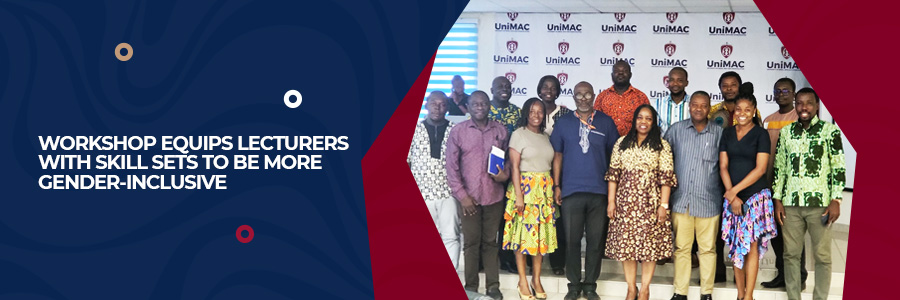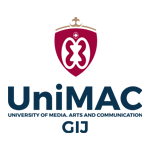
The Faculty of Journalism and Media Studies of UniMAC-IJ, on Friday, 27th October, 2023, organized an all-lecturers workshop at the institute’s auditorium under the theme: “Creating a Gender Sensitive, Non-Discriminatory and Inclusive Curriculum, Classroom and Work Environment.”
The event, which forms part of the project activities of the UNESCO Excellence in Journalism Education in Africa Grant aims to equip lecturers with the relevant knowledge and skills to teach students about gender-sensitive and ethical reporting. The workshop assessed the journalism curriculum, which was preceded by training through discussions and practical exercises on gender sensitivity and stereotypes and their importance on journalistic reporting, among others.
According to the project leader, Dr. Benedine Azanu, the exercise forms part of a larger initiative by UNESCO to promote gender equality and create a gender-responsive, gender-inclusive and gender diversity in the curriculum, classroom and at the Institute of Journalism, since the practice of journalism plays a pivotal role in shaping public opinion and attitudes.
Participant’s feedback about the training revealed that the workshop was timely and eye-opening. According to some, the training thoroughly furnished them with the compass for gender-sensitivity in teaching journalism.
According to faculty lecturer Dr. Ebo Afful, the discussions were inspiring as he was challenged to find the most appropriate ways to incorporate the skills acquired and be impactful during his lectures. “I intend to change my course title from Investigation Reporting to Investigative Reporting and Gender.”
Dr. Awuku, who was also in attendance at the workshop opined “I critically think that there should be a gender policy within the university. This will really arm the institution in tackling gender issues.” He further added, “Such workshops should be organized regularly and must be done on a much larger scale to include other faculty members. . Acquiring the technical know-how on gender-related issues is crucial to any academic institution today and it is therefore essential to include gender in course outlines”.
After assessing their respective course outlines during a breakout session, other participants remarked that their outlines barely had elements of gender inclusivity informing a decision to incorporate gender sensitivity to foster a more gender-inclusive classroom.
Development and Data Journalism lecturer, Dr. Semarco remarked “I entreat my colleague lecturers who teach this course to inculcate the Sustainable Development Goals (SDGs) on Development and Data Journalism. This will enable us to teach gender-related subjects more effectively”.
Adding his voice, Mr. Samuel Danso remarked “Since we barely teach anything related to the impact of social media on gender equality, the time has come to do so and I believe the training has gotten us started.”
Another participant, Dr Caroline Aboagye Da-Costa admitted that she learned how gender bias can be subtle and unconscious. “It is not always overt and intentional; however, it can still have a negative impact on people”.
On female stereotypes, Mr. Martin Thompson Ntem said, “I’ll really love to encourage our female students to venture into investigative and photojournalism to break barriers”.
Ultimately, the workshop concluded with participants feeling more confident in their ability to identify and challenge gender bias in their own lives and in the workplace.
